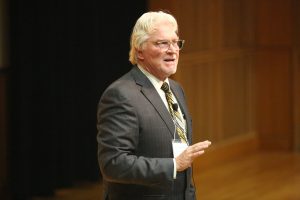Identity and Identification in Rural Collective Entrepreneurship
Thursday, April 6, 2023
12:00 p.m.–1:00 p.m.
Norman Smith Hall, Room 107
University of Maine, Orono, Maine (Google Maps)
Dr. Randall Westgren discussed findings from a series of research and outreach projects on collectives in the agritourism sector – particularly wineries that comprise wine trails. Results show that where there is no identification gap, trails with strong identities – that are clear and supported by members – yield superior revenues and profits over and above what the wineries can generate as individual firms. Extensions of these findings to agri-tourism collectives and grower groups trying to establish a regional brand are offered.
Video: Identity and Identification in Rural Collective Entrepreneurship
Speaker Bio

McQuinn Chair in Entrepreneurial Leadership
University of Missouri
Randall Westgren, Ph.D., is a professor of agricultural and applied economics at the University of Missouri. He holds the Al and Mary Agnes McQuinn Chair of Entrepreneurial Leadership. He teaches courses in entrepreneurship and researches intra-firm and inter-firm strategic management in the agri-food sector.
Abstract
Rural entrepreneurs – and the persons and institutions that seek to support the creation and scaling-up of their ventures – are challenged by the Liability of Smallness. In a world of nearly infinite choices for consumers and tourists, breaking through the competitive noise requires more resources than can typically be taken from competing needs in the entrepreneurial firm’s environment, particularly in agri-food, agri-tourism, and other resource-dependent businesses in the countryside. One possible strategy is to mimic scale by collective action for joint marketing and brand-building around what the collective offers to latent customers.
At the heart of the collective action problem is the successful construction and communication of the collective identity: who are we? Failing to construct a meaningful shared identity can make cobbling together a group of individual firms difficult; an important facet of “who we are” is missing. That is, “what we are about” or “we-ness” has to have sufficient coherence so that the collective creates value over and above the individual members of the collective. If all members produce farmstead cheese, what is the value of the group action? Lower joint marketing costs? Additional value for a regionally identified product? Easy access to the members’ products for area restaurants, retailers, or tourists?
If not all members identify with the group goals, strategies, and shared “brand” image we see an identification “gap”. Disaffected members will not support group activities and investments, will not promote other members’ forms and products, and will likely defect from the collective. This is a second fatal consequence of not constructing and communicating the identity correctly.
In this presentation, Dr. Westgren will discuss a series of research and outreach projects where he and colleagues collected data from collective members, especially from wineries that comprise wine trails. They can show that where there is an identification gap, collectives are unstable and their communications to prospective customers and agri-tourists fail. In contrast, trails with strong identities that are clear and clearly supported by members yield superior revenues and profits — effectively over and above what the wineries can generate as individual firms. Dr. Westgren will suggest some extensions of these findings to agri-tourism collectives and grower groups trying to establish a regional brand.
If you are a person with a disability and need an accommodation to participate in this program, please contact Mary Michaud at mary.j.michaud@maine.edu or 207.581.3175 to discuss your needs. Receiving requests for accommodations at least 10 days before the program provides a reasonable amount of time to meet the request, however, all requests will be considered.
In complying with the letter and spirit of applicable laws and pursuing its own goals of diversity, the University of Maine System does not discriminate on the grounds of race, color, religion, sex, sexual orientation, transgender status, gender, gender identity or expression, ethnicity, national origin, citizenship status, familial status, ancestry, age, disability physical or mental, genetic information, or veterans or military status in employment, education, and all other programs and activities. The University provides reasonable accommodations to qualified individuals with disabilities upon request. The following person has been designated to handle inquiries regarding non-discrimination policies: Director of Equal Opportunity, 101 Boudreau Hall, University of Maine, Orono, ME 04469-5754, 207.581.1226, TTY 711 (Maine Relay System).
